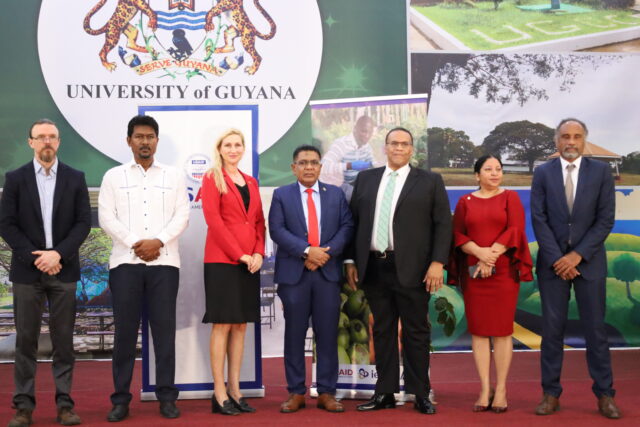The Caribbean Agricultural Productivity Improvement Activity (CAPA), a $5.3 million project funded by the United States Agency for International Development Eastern and Southern Caribbean (USAID/ESC) was recently launched at the University of Guyana’s George Walcott Lecture Theatre. The event was marked by an address from Agriculture Minister, Zulfikar Mustapha, representing President Dr. Mohamed Irfaan Ali.
Minister Mustapha said the project is critical given its focus on revolutionizing the fruit and vegetable sector in the Caribbean. He stated, “The CAPA is aimed at helping farmers and stakeholders in the fruit and vegetable industry by promoting the use of market-driven agricultural practices and technologies, enabling them to easier access domestic and regional markets.” He noted that this initiative arrives at a crucial time as global economic challenges and heightened food security concerns loom large.
Highlighting the vulnerability of the Caribbean to climate change, Minister Mustapha pointed out the need for adaptation in agricultural practices. “With the Caribbean being one of the regions of the world most vulnerable to climate change, the constant threat of climate-related disasters has constrained investment in the agriculture sector,” he said. He also elaborated on how CAPA will enhance small-scale farmers’ access to agricultural inputs and technologies, including climate-smart agriculture.
The United States Ambassador to Guyana, Nicole Theriot, during her remarks outlined the project’s broader significance. She recounted discussions at the 2022 Summit of the Americas, leading to the formation of a food security action committee. This committee’s efforts culminated in CAPA, a key part of U.S. and Caribbean strategies to combat food insecurity, exacerbated by global events like Russia’s invasion of Ukraine.
Minister Mustapha also linked CAPA’s objectives with regional goals, particularly CARICOM’s Vision 25 by 2025 Initiative, aiming to reduce food import bills by 25% by 2025. He said, “Many of the commodities targeted in this project, including spices, coconuts, fruit juices, and niche vegetables like Bell pepper, cauliflower, kale, lettuce, and tomato, are identified as priority commodities under the 25% by 2025 programme.”
He further explained how CAPA aligns with ongoing regional strategies, enhancing connections between domestic and regional markets and smallholder farmers. “This project stands to benefit from the work commenced by The CARICOM Private Sector Organisation (CPSO) in identifying business cases for the production and processing of many of these products,” he added.
He said too that the launch commemorates the start of a new initiative responding to CARICOM leaders’ request to the United States to address food insecurity. It follows a collaborative effort to develop joint action plans at the 9th Summit of the Americas in 2022.
In November last year, Minister Mustapha had discussions with the CAPA team, identifying key areas for development aid in Guyana, including value chains for turmeric, coconut, and cherries. Guyanese farmers, along with others in the region, are set to benefit from specialized technical assistance under this project.













